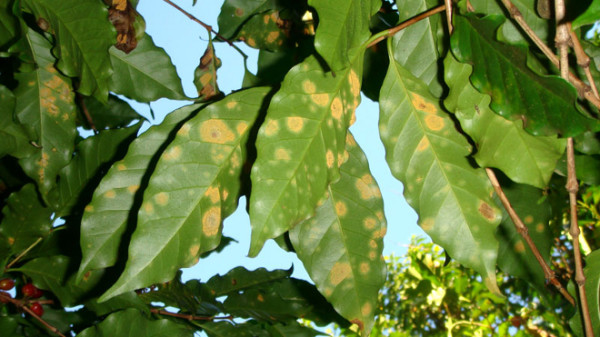Texas A&M-based World Coffee Research and the Obama administration today unveiled one the world’s most ambitious and collaborative responses to leaf rust (la roya) to date, a nearly $5 million Global Development Alliance initiative to assist smallholder farmers and the entire Central American coffee market.
Part of the United States Agency for International Development’s (USAID) Feed the Future project, the initiative will be led by WCR, which is partnering with development institutions in Costa Rica, Honduras, Guatemala, Panama, Dominican Republic and Jamaica (PROMECAFE), and the Tropical Agricultural Research and Higher Education Center (CATIE).
While the project will directly benefit smallholders throughout Central America, the Caribbean and Peru, the impact is likely to spread throughout the coffee growing world by creating a public/private model for a pipeline of pest-resistant, higher-yielding and higher-quality varieties, while also monitoring market factors to determine the long-term viability of smallholder farming.
(related: GMCR Announces $7 Million Private-Public Leaf Rust Resistance Investment)
“By partnering with innovators from College Station to Colombia, we can promote broad-based economic growth for the world’s most vulnerable people,” USAID Administrator Rajiv Shah said today. “Fighting epidemics like coffee rust empower entrepreneurs and create sustainable livelihoods for families – helping entire communities become self-sufficient.”
WCR Executive Director Tim Schilling says the GDA is in response to the “double whammy” of leaf rust and price volatility that have hurt Central American producers since the disease outbreak in 2012. Project partner PROMECAFE says production is currently down 20 percent throughout Central America from 2011.
(related: Buy a Bag, Plant a Tree: A Roaster’s Model for Smallholder Sustainability Amid La Roya)
“Central America must shoot for the higher end of the market and this GDA will allow that to happen by providing high quality, rust resistant varieties tailored for specific eco-geographic zones,” Schilling said.
In addition to the research and field work in Central America, two post-doctorate coffee biotechnologists will be working in College Station under the direction of Martin Dickman in the College of Agricultural Life Sciences, and “bio-control” research will be carried out at the Federal University of Viçosa in Brazil and Kew Gardens in London.
“This multi-stakeholder initiative creates essential linkages between industry, research institutions and NGOs to provide coffee farming families with more tools and greater capacity to confront a growing number of threats to their coffee and their livelihoods,” said Lindsey Bolger, a WCR Chairperson and vice president of coffee sourcing at Keurig Green Mountain. “By engaging with WCR, coffee roasting companies like Keurig Green Mountain can leverage their interest in ensuring a long-term supply of high quality coffee while helping to address the immediate needs of coffee producing families and communities.”
(related: Leaf Rust Fallout: ‘Negative Coping Strategies’ and Food Insecurity)
WCR has outlined five priorities for the project, all of which respond to the idea that Central America should be “a major supplier of top drawer coffees for the most discriminating and lucrative markets.” They are:
- Assist producers in making the best investment decisions in varietals for plantation renovation.
- Assist the private and public sectors in multiplying the best varietals and in making them available to producers.
- Track this coffee production trend data, including socio-economic variables for producers, and provide a comprehensive analysis of the viability of smallholder farming in Central America.
- Create a pipeline of readily available, high-quality, pest-resistant genetic material to advance the best varieties to farmer evaluation and eventual commercialization.
- Support a multi-stakeholder effort to create a high-tech breeding program to provide the highest level of quality-tailored, adapted, climate resilient, and pest resistant ‘breeding’ blocks.
Nick Brown
Nick Brown is the editor of Daily Coffee News by Roast Magazine.







Comment